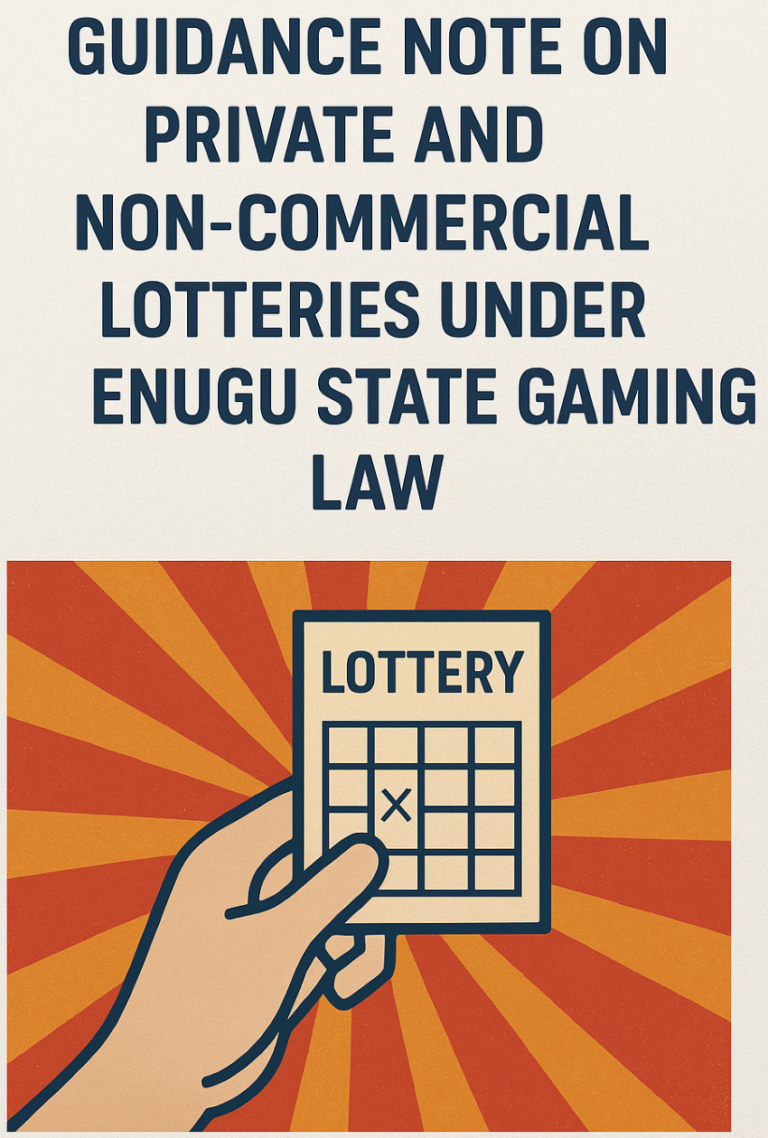Suppose your school or the school’s alumni plans fundraising through a private or non-commercial raffle within Enugu State. In that case, you should obtain a permit from the Enugu State Gaming & Lotto Commission (ESGC) before advertising, selling tickets, or drawing prizes. Even if 100% of lottery proceeds go to an education endowment fund.
Background
While formal lotteries were not part of Nigeria’s colonial-era education fundraising drives, communities relied on traditional collective finance systems such as esúsù/ajọ, isusu and traditional crowdfunding to pool resources for social goals.
Under the colonial era, mission schools and churches harnessed the communal spirit through bazaars and school fairs, where games of chance and raffles often featured as fundraising tools.
After independence, alumni associations of secondary and tertiary schools increasingly embraced similar methods. The culture of embedding raffles and prize draws within reunions, anniversaries, and donation drives is part of Nigeria’s alumni-led educational fundraising.
Following this tradition of community and school-based fundraising, State Governments such as Enugu State Gaming & Lotto Commissions treat education fundraising raffles and similar games as regulated lotteries, requiring permits to ensure fairness, transparency, and accountability.
Additionally, the 2018 Federal Competition and Consumer Protection Act provisions apply to every private and charitable lottery in Nigeria.
How the Supreme Court Changed the Rules
On 22 November 2024, Nigeria’s Supreme Court held that lottery/gaming is a state’s residual matter, and the National Lottery Act applies to the FCT only.
Education fundraising raffles fall under state lottery law and state regulatory permits. Educational institutions and their Operators can no longer rely on a federal licence outside Abuja.
Enugu Lottery Law at a glance
Enugu State regulates raffles, lotteries, and related “draw games” under its Gaming Law, administered by the Enugu State Gaming & Lotto Commission.
ESGC’s mandate includes licencing, monitoring, and enforcing all gaming/lottery categories in the state. A school or alumni raffle draw is a charity or non-commercial private raffle.
In late 2023, the Enugu State Government warned promoters of lotteries and games that raffles or bets without prior ESGC clearance attract sanctions. Schools and alumni associations should treat endowment raffles as permit-requiring events.
Do Schools need a Permit for a 100%-charity raffle?
The Enugu state lottery regime and state lottery laws do not exempt a raffle simply because proceeds are charitable or educational.
If money is paid for a chance to win a prize, it is a regulated lottery/draw enforced by ESGC.
What does a compliant process look like?
While Enugu does not publish a detailed online fee table, schools and universities should plan a two-stage approach: permit application and post-permit compliance.
ESGC has directed promoters to approach its office to regularise draws; use that route and keep a tidy paper trail.
Step 1: Document before approaching ESGC
Use our charitable raffle checklist as an additional resource here.
- Raffle rules: eligibility (students, staff, alumni, public), ticket sales terms and conditions, sales period, draw date, prize list/values, winner selection and verification, treatment of unclaimed prizes.
- Charitable purpose statement: Confirm 100% of the proceeds to the endowment; attach the governing council’s approval. You may deduct associated expenses as well.
- Integrity controls: ticket serialisation, reconciliation of sales, segregation of funds, independent draw witness, complaints channel, and exempt your staff members from ticket purchase.
- Marketing plan: Drafts of posters/social posts; online ticket sales; ensure all materials are “subject to ESGC permit” until approval issues.
- Data protection: simple privacy notice for buyer data.
Step 2: Apply to ESGC for a permit
Submit an application letter and your pack to ESGC for clearance. Expect to pay prescribed licensing fees. Keep copies of receipts/approvals for audit and the donor relations team.
Step 3: Operate & report
- Sell tickets only after permit issuance; display the permit number in all materials.
- Conduct the draw as approved; keep attendance notes, video evidence if possible, and a winners’ register.
What to budget
Enugu’s public portal does not list a granular fee schedule for promotional/charity draws. ESGC typically levies application/licence administration and may impose good-cause/signage-type charges under its enforcement powers.
Your finance office or education lawyers should budget for modest permitting, signage/administrative fees and obtain an official quote during applications.
Practical tip: Ask ESGC up front for (i) application fee, (ii) permit fee (per event), and (iii) any levy tied to draw frequency or prize value—then reflect these in your internal memo and donor communications.
Conclusion
For a private or public university or its alumni association in Enugu State, an endowment raffle is viable but only with ESGC permitting and tight compliance.
Start early, document everything, and treat ESGC as a partner. The result is a clean, reputationally strong fundraiser aligned with the new state-centric legal order.
Enugu State lottery regime operates under an older framework (rooted in the 1991/2004 Revised Laws). In contrast, Lagos enacted the Lagos State Lotteries and Gaming Authority Law, 2021, consolidating all gaming categories under one modern authority with more explicit stakeholder protections and express coverage of promotional lotteries.
Following the Supreme Court’s decision, State Governments regulate lotteries within their borders. If your alumni base spans multiple states (e.g., online ticketing), you must geo-fence sales or consider multi-state permitting.
Lagos law commentary is a helpful reference point for what “good practice” looks like post-judgment.


